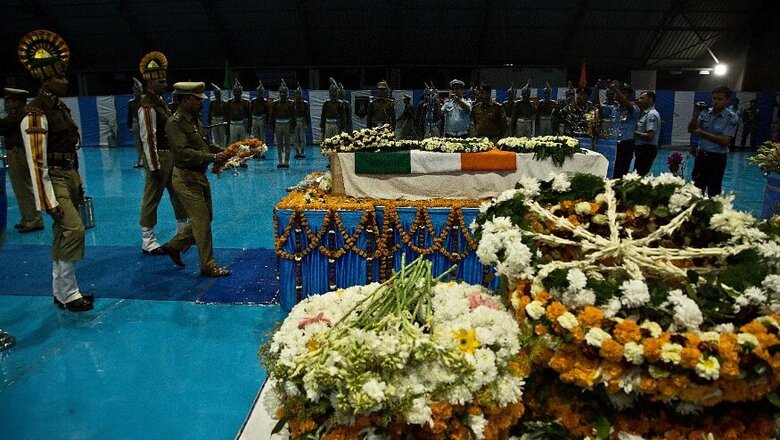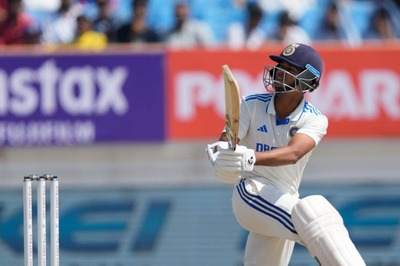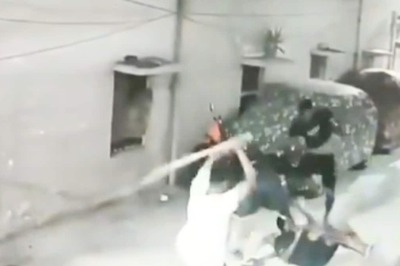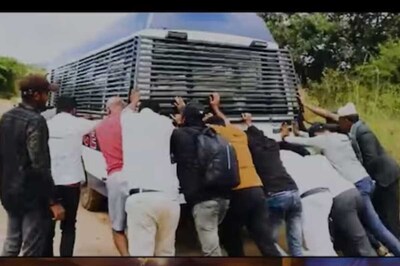
views
New Delhi: Following the deaths of 40 CRPF jawans in the dastardly attack on their convoy in J&K’s Pulwama, a debate broke out in newsrooms and on discussions boards over the usage of the term ‘martyrs’. On Tuesday, the Delhi High Court dismissed a plea seeking direction to media houses to use ?martyr? instead of ?killed? while referring to soldiers killed in action.
The CRPF jawans were addressed as martyrs in resolutions passed in various state assemblies to condemn the terror attack and to announce compensation for the bereaved families from the respective states. While the Madhya Pradesh government announced compensation of Rs 1 crore, the Uttar Pradesh and Uttarakhand governments announced Rs 25 lakh each. Uttarakhand CM Trivendra Singh Rawat also assured government jobs to one member from each family.
But has this compensation always reached martyrs’ families or are they just left with pensions? News18 explains:
Who is a ‘martyr’?
The dictionary meaning of ‘martyr’ is one who is killed for his or her religious or other beliefs.
The attack carried out by Jaish-e-Mohammad suicide bomber Adil Ahmad Dar was prima facie an attack on Indian forces. To see such a death from the prism of martyrdom is completely subjective, but has no place in the lexicon of the Government of India.
Does the government identify a ‘martyr’?
The government does not recognise the term ‘martyr’. In December 2017, the government had informed the Central Information Commission that there was no term as ‘martyr’ or ‘shaheed’ in the army or the police. Instead, a soldier or policeman killed in action is called ‘battle casualty’ or ‘operations casualty’, respectively.
In 2016 too, the Ministry of Home Affairs informed the Lok Sabha that the word ?martyr? is not used in reference to any casualties from the Indian armed forces during battle.
?No such term is used in reference to the Central Armed Police Forces and Assam Rifles personnel who get killed in action or in any operation,? Minister of State for Home Kiren Rijiju had said in response to a question.
So then, why did paramilitary officers demand status of ‘martyrs’ for jawans killed in the line of duty?
While soldiers killed in the line of duty have been referred to as ‘martyrs’, paramilitary forces claim they have been denied the status. The government insists, however, that no such terminology is used in the three services and ?no such order/notification has been issued by the Ministry of Defence (MoD)? to call those killed in action as ‘martyrs’. The government also maintains that no such notification has been issued for the Central Armed Police Forces and Assam Rifles personnel either.
The petition was also based on data which said that as per Home Ministry records, between September 2011 and August 2015, a total of 546 police and paramilitary personnel lost their lives on duty due to “unnatural" causes, including in action.
The status of ?martyr? is not accorded to armed forces personnel who sacrifice their lives in the line of duty and hence cannot be given to the paramilitary forces, government had told the Delhi High Court, terming a plea on the matter as ?misconceived?.
?The prayer? to grant ?martyr? or ?Shaheed? (status) to Central Armed Police Forces at par with Army, Navy and Air Force is misconceived as the very same status is not actually being granted to the personnel of Army, Navy and Air Force,? a bench of justices S Ravindra Bhat and Deepa Sharma was informed.
How does the government grant compensation to a jawan who dies while on duty?
The compensation provided is under the Liberalised Pensionary awards in the case of death/disability as a result of (i) attack by or during action against extremists, anti-social elements, etc and (ii) enemy action in international war or border skirmishes.
The deaths of 40 CRPF personnel in Pulwama would come under Category D, which includes death or disability attributable to acts of violence by terrorists, anti-social elements etc, whether in their performance of duties or otherwise.
Apart from cases of death or injury sustained by personnel of the central police organisations while employed in aid of the civil administration in quelling agitation, riots or revolt, other public servants, including police personnel, killed or injured in bomb blasts in public places or transport, indiscriminate shooting incidents in public etc. would be covered under this category.
What is the monetary compensation payable to bereaved families of soldiers?
According to the rules, an ex-gratia compensation from the central government is disbursed —Rs 10 lakh for deaths due to accidents in the course of duty or for deaths in the course of duty attributable to acts of violence by terrorists. Apart from this, the widow of the jawan would receive a pension, which would go to the parents in case he was unmarried.
But have such payments been made in the past?
Unfortunately, the payment of ex-gratia amounts have often been a bone of contention between the families and the government.
In December 2017, the daughter of a BSF jawan killed in Srinagar was stopped by police officials from rushing towards Gujarat Chief Minister Vijay Rupani during a rally to demand the payment of compensation.
Similarly, a martyr’s mother, who was in her 60s, was detained by the police when she tried to breach Prime Minister Narendra Modi’s SPG security, demanding compensation following the death of her son.
In some other cases, compensation was handed to families, but the cheque embarrassingly bounced like in the case of Ranjeet Kumar who hailed from Sheikhpura and was killed in action on lost April 24, 2017. When his family finally got the cheque for Rs 5 lakh, it bounced.
In 2018, family members of martyrs from Karnataka faced painful delays in getting their ex-gratia package or compensation from the state government as relevant files were held up at respective district commissioners’ offices. As per data reported then, in the last three years, over 14 soldiers from Karnataka had died while on duty, and only one family, that of Lance Naik Hanumanthappa Koppad, was given land as part of ex-gratia payment.
The delays had also led to Karnataka Lokayukta Justice P Vishwanatha Shetty directing the state government to dispose of the applications of martyrs’ families within eight weeks.




















Comments
0 comment